
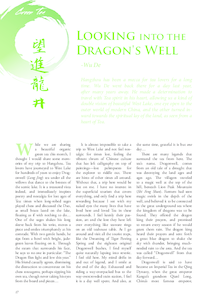 |
|
While we are sharing a beautiful organic green tea this month, I thought I would share some memories of my trip to Hangzhou. Tea lovers have journeyed to West Lake for hundreds of years to enjoy Dragonwell (Long Jing) tea under all the willows that dance to the breezes of the scenic lake. It is a treasured vista indeed, and immediately inspires poetry and nostalgia for lost ages of Tea: times when long-robed sages played chess and discussed the Dao, as small boats lazed on the lake, floating as if with nothing to do... One of the sages shakes his long sleeve back from his wrist, moves a piece and smiles triumphantly at his comrade. With two gentle hands, he sips from a bowl with bright, jadegreen leaves floating on it. Through the steam that surrounds his face, he says to no one in particular: "The Dragon flies light and low this year." His friend casually agrees, dismissing the distraction to concentrate on his chess stratagems, perhaps sipping his own tea, though never taking his eyes from the board and pieces...
It is almost impossible to take a trip to West Lake and not feel nostalgic for times lost, feeling the vibrant thrum of Chinese culture that has left calligraphy on top of paintings - lost palimpsests for the explorer to riddle out. There are hints of other times all around. Without that, a trip here would be lost on me. I have no interest in the superficial tourism that covers everything, and only find a trip here rewarding because I see with my naked eyes the many lives that have lived here and loved Tea in these surrounds. I feel keenly their passion, art and the lore they have left over everything like teaware rings on an old teahouse table. As I go around and visit all the tourist traps, like the Dreaming of Tiger Pawing Spring and the eighteen original Dragonwell bushes, I find myself quite naturally lapsing into reverie. I feel old here. My mind drifts in and out of legend, and I smile at the end of the day. Exhausted and riding a way-overpacked bus to the way-overcrowded train station, I feel it is a day well spent. And also, at the same time, grateful it is but one day...
There are many legends that surround the tea from here. The tea's name, Dragonwell, comes from an old tale of a drought that was destroying the land ages and ages ago. The villagers traveled to a magic well at the top of the hill, beneath Lion Peak Mountain (Shi Feng Shan). Farmers had seen magic swirls in the depth of the well, and believed it to be connected to the great underground sea where the kingdom of dragons was to be found. They offered the dragon king their prayers, and promised to return every season if he would grant them rain. The dragon king heard their prayers and sent forth a great blue dragon to shake the sky with thunder, bringing muchneeded rain to the area. And the tea was called "Dragonwell" from that day forward...
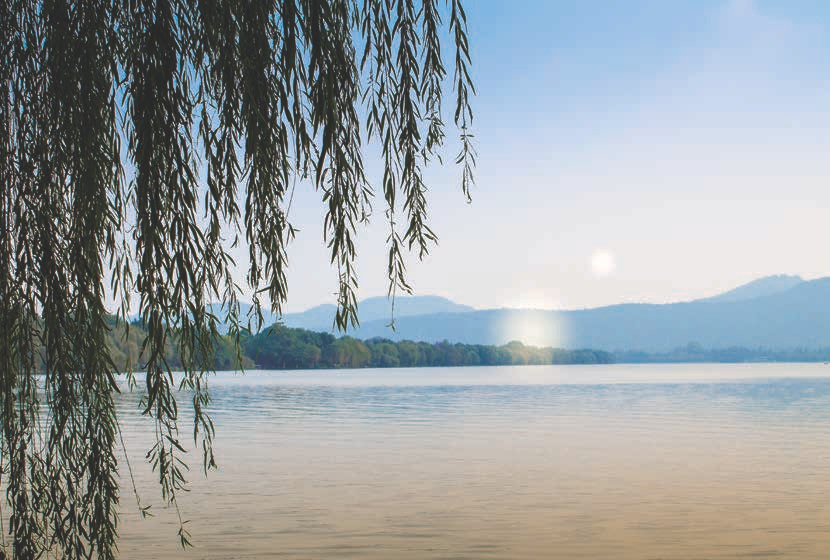
Down the dragon's well Thunder rises To carry me home. Mother is ill, So I dare not tarry Where the tigers once played. I carry the Morning Dew Folded onto my breast. Opening Heaven's Way, We ride from West Lake Never to see its shores again. The golden light Will still shine on these waters Long after my empire has faded. Will those who rest here and sip Feel me, as I carry away these leaves? Do we drink of the same cup Or does the distance swell too vast? Ask the dragons.
Dragonwell is said to have become an Imperial Tea in the Qing Dynasty, when the great emperor Kangxi's grandson Qianl Long, China's most famous emperor, visited West Lake and drank the tea. Qian Long loved Tea, almost as much as he loved leaving the Forbidden City in disguise, having many legendary adventures during his outings. And being a tea lover, many of them have to do with tea. They say that tapping on the table to say thanks for a cup of tea, for example, comes from bowing to the disguised emperor when he was sharing tea with ordinary people. On one trip, he went to see the monks at Hu Gong temple in West Lake because he had heard of their marvelous tea. He fell in love with the green tea from the original eighteen bushes and conferred them imperial status. They say that those eighteen bushes still live today, though locals question their authenticity. Still, the tea from those old trees does glimmer with energy, and is auctioned off for quite a price whenever they are harvested.
I visited the eighteen trees and sat and drank some unclean Dragonwell in the café there, feeling nostalgic after a long day strolling by the willows that surround West Lake and later admiring the tea fields there. I asked several locals about organics and was met with quizzical looks. One café owner said that "yes" her tea was organic, "We only spray pesticides in the spring and now it's autumn!" The old eighteen bushes themselves were definitely clean, though, and worth admiring. Many of the locals I passed said that the trees weren't the original ones, and had been transplanted there more recently to invite tourists. It was hard to tell if there was any truth in this, as most of them wanted me to sit in their café and buy their tea rather than travel to the old bushes further down the road.
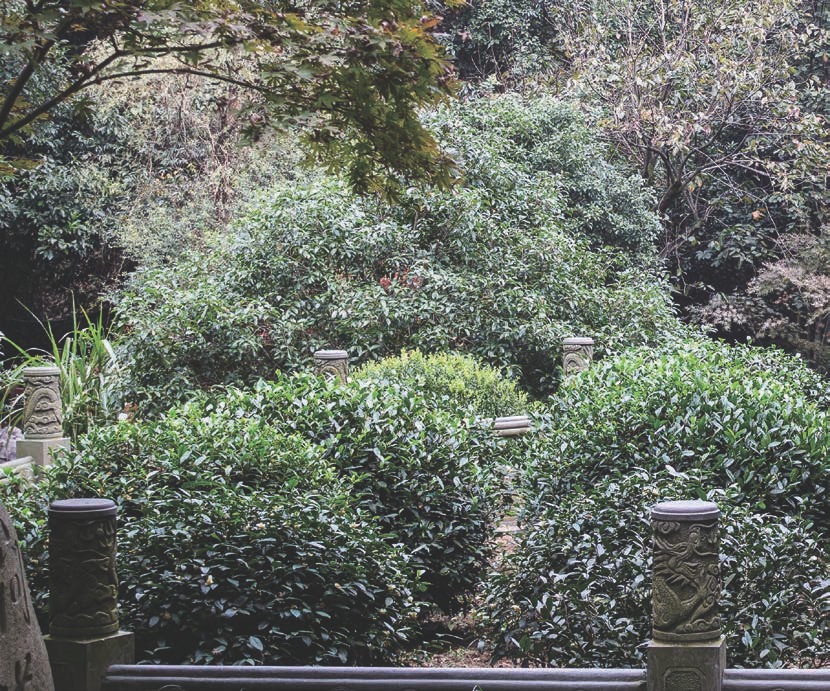

I contemplated how a lot of Chinese historical sites are rebuilding and repackaging themselves to attract a new kind of tourism based on nostalgia. It often seems as if the aim of rebuilding has nothing to do with recreating the original sites, most of which were destroyed in the Cultural Revolution. Rather, the focus in construction these days seems to be about how to inspire nostalgia and cultural identity in modern Chinese tourists so that they buy tickets. Obviously, a man living here in Hangzhou during the Qing Dynasty (1644-1911) wouldn't have had to stop on a given Tuesday and admire his queue hairstyle, long robes or traditional furniture, with a hand on his hip, proudly thinking, "Yep, I'm Chinese alright!" He didn't need to feel Chinese; he was Chinese! Nowadays, globalization and the Cultural Revolution have resulted in a modernized China. Like most people in the world, Chinese mainly wear Western clothes, use cell phones and eat a variety of foods. They decorate their homes in many styles and with more and more variety as they join the global economy and the quality of life improves. When you add the fact that a whole generation of Chinese was raised without its own history or culture, it's no wonder there is a market for things that make one nostalgic - for a feeling of connection to heritage and history.
Despite the often plastic and shallow aspect of repackaged culture, much of the nostalgia for ancient/traditional Chinese culture isn't lost on a sinophile like myself. I sat above the gorgeous eighteen trees, surrounded by a beautiful garden and drinking my mediocre tea, and strayed into another time... I imagined hiking up trails where there are now roads with a gourdfull of spring water and heating it over a small fire. I could see myself meditating in the temple here with the monks, and saw in my mind a montage of leaves dancing into bowls, covered in steamy water and jade swirls as the flat green leaves floated around and under the swirling water. I stroked my beard in a kung fu movie way, and smiled at the old trees - they seemed to be in on my secret.
Legend has it that the flat shape of pan-fired Dragonwell also comes from Qian Long. He wanted to try his hand at tea processing, but during the harvest, a messenger ran up with word from the palace: his mother had fallen ill. He quickly stuffed the magical leaves into his coat pocket and raced to Beijing. Back in the capital, he brewed the green jade for his ill mother. She was quickly healed, as people always are by Tea in such stories. They say that the flattened shape of Dragonwell is in honor of that handful of leaves that were crushed in his pocket on the journey.
I have written often of old Qian Long. I imagine him sneaking out, drinking tea he shouldn't be preparing himself in some nook of the palace - much like Huizong, whom we discussed last month - and sometimes even have visions of him hanging around laughing and drinking with the cooks and dishwashers in the palace kitchens. Such imaginations seem very Zen to me, and make me feel warm inside. In honor of my old tea brother, who still inspires so many artists, poets and Chajin worldwide, I picked a few buds from the old trees while nobody was looking and put them in some paper in my pocket. Sure enough, they were flat a few days later when I tossed them in a bowl and reminisced about my trip to West Lake.
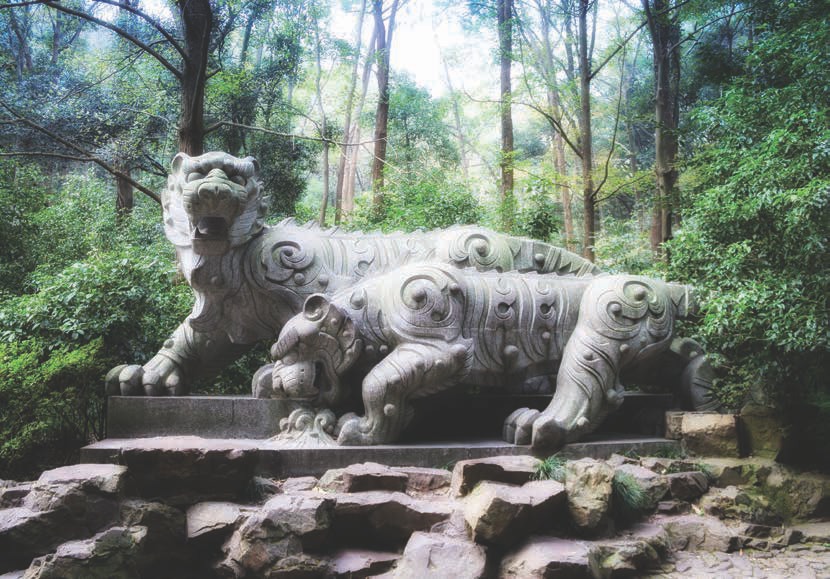
After the eighteen trees, I headed down to the Dreaming of Tiger Pawing Spring, which is often mistranslated as the Tiger Leaping Spring, because 'pawing' and 'leaping' are homophones in Chinese (pao 趵 and pao 跑). There are two springs nowadays, and a controversy over which is the authentic one. The more public one is full of tourists, while the other is quieter. I drank some tea with both and found the water to be about equal. The more famous spring comes up out of an underground source, passing over minerals and quartz crystals to lend it power and breadth that is good for Tea. This water has been paired with this tea for centuries. I imagined myself coming here when it was just a spring in the forest, having just picked and processed some fresh spring Dragonwell with my own hands. What it must have been like to drink that tea? Uplifting and clearing are the sentiments that come to mind, as I sit drinking my own watered-down version, ignoring the kids camping and tourists clacking photos.
The spring gets its name from the monk Huan Zhong. He was traveling and looking for water when he finally passed out, lost and parched. In his dream, an immortal told him that two tigers would soon come and rescue him. He awoke to find two tigers peacefully resting at his feet. Due to the immortal's words, he was not alarmed and stood up, brushing off the dust. The tigers began playfully prancing down the trail, leading the old monk onwards. Eventually, they took him off the trail and up a slope to a small clearing. They began pawing at the ground until crystal spring water rushed out of their hole. The monk bowed to the tigers, which roared and leapt off into the woods...
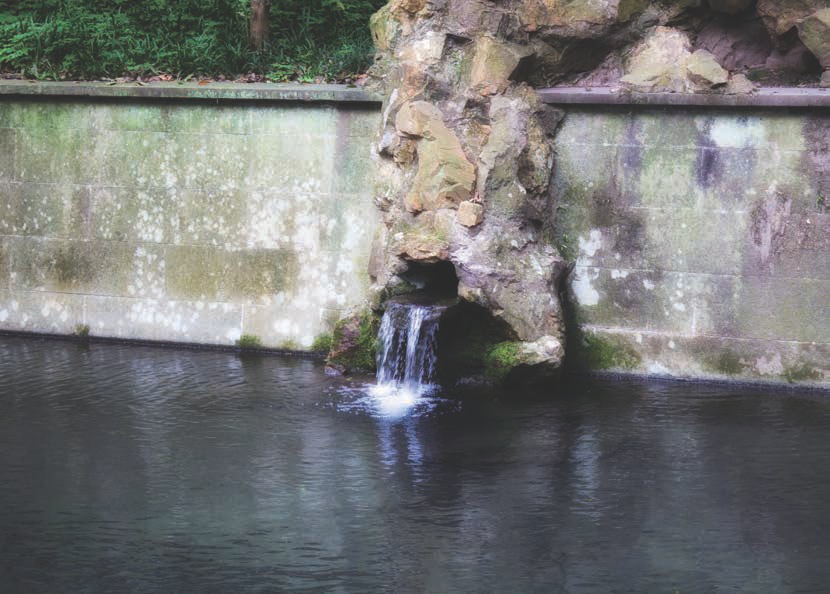
Many people wait in line for hours at the spring's bottom to fill plastic jugs and bottles, once again projecting a modern drear over an otherwise scenic hike. But I'm impressionable. I sit with a glass of Dragonwell floating in some spring water I got and heated myself (for a small fee to the café) and find a nice rock in a corner of the park that is uninteresting to others. I can feel all the tea lovers who have loved this water. And underneath all the pollution - of modern industry and tourism - Mother Earth's song is still audible to me. It takes a real tea lover to turn a trip to these spots into something meaningful and rewarding. But if you do love Tea as much as I do, it isn't that hard. There's a lot of Tea energy around to inspire and reward you.
The temple here is also the burial spot of one of my favorite Zen monks, Li Xiu Yuan, better known as "Ji Gong." He lived in the Southern Song Dynasty (1127-1279). According to legend, he was a champion of farmers and simple peasants, who still have shrines honoring his image. He has taken on the airs of a Daoist immortal to them, with stories of supernatural powers and the same eccentric manners as most Daoist sages: he's one of the wellknown Zen rascals, whose misbehavior simultaneously causes one to cringe, giggle and also realize profound truths about the limitations of any one approach to the sacred. I said some prayers for him - one rascal to another - and left to stroll by the lake one last time in the dying light...
If you ask me if it is worth braving the noise, crowded buses and overfull tourist traps filled with kitschy, post-modern nostalgia to pay homage to the Dreaming of Tiger Pawing Spring and the eighteen original Dragonwell bushes and then brew them together, I'd say yes. But that is only because I am a poet and a dreamer. The West Lake itself has a natural charm that transcends the modern, so it is easy to recommend Hangzhou to those traveling in China. It's not that I don't see the inorganic, unsustainable tea and the tourism that surrounds it as a call to change. I do. But while there, I made a heart-commitment to breathe, transcend and travel mythically - to travel with both the open eye and the half-closed one. It's a combination mystics are famous for...
